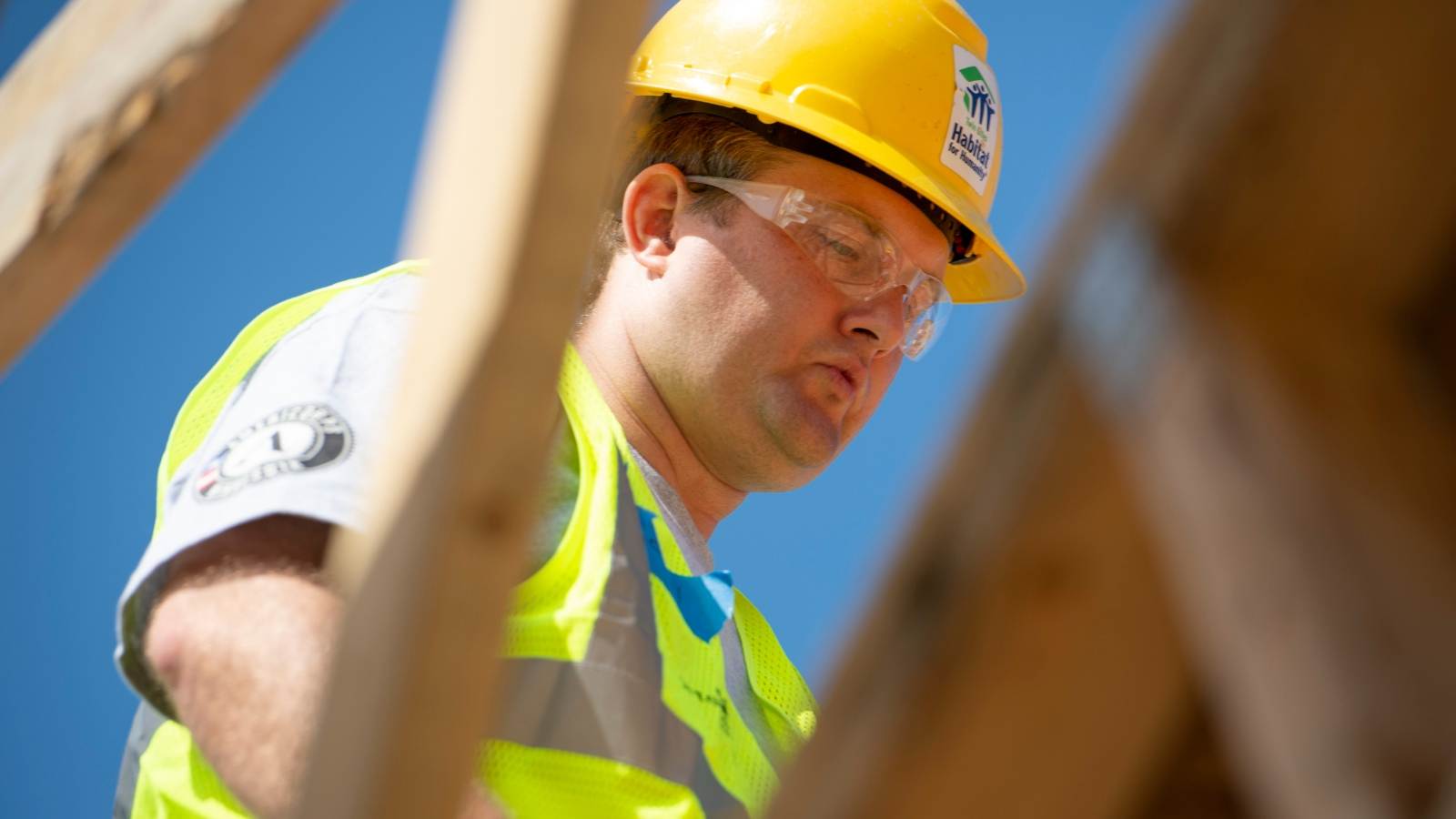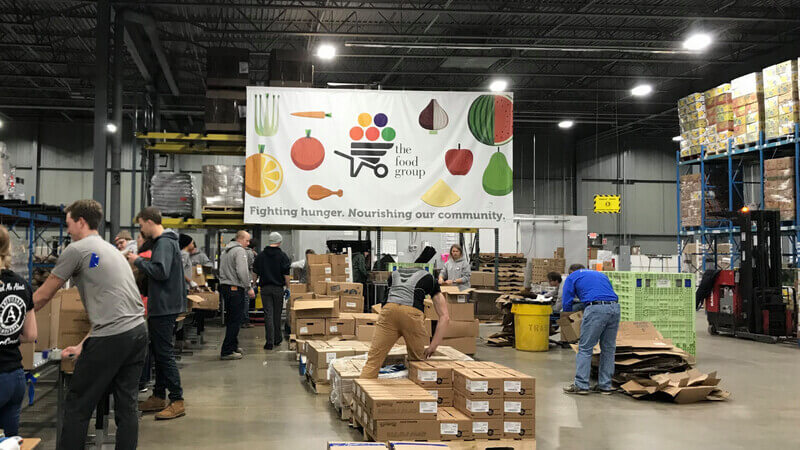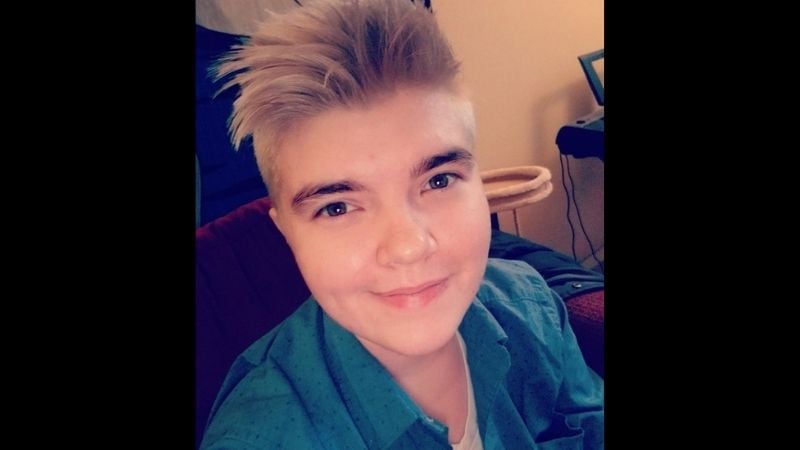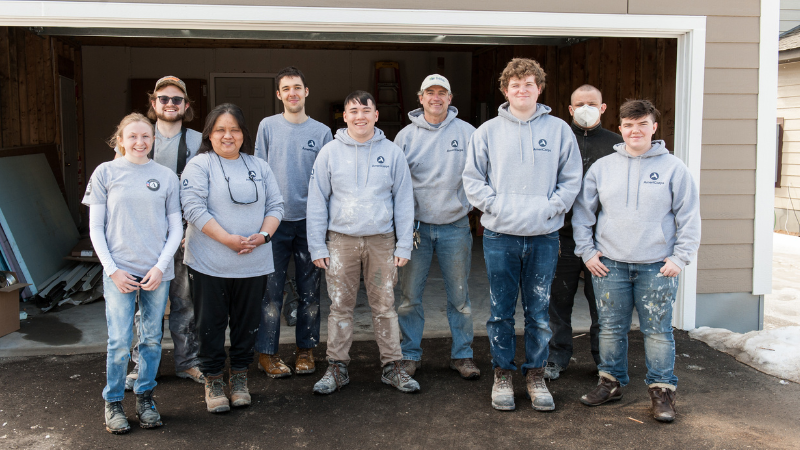My Alternative Service Experience at The Food Group
At Habitat, most AmeriCorps members hold the position of Construction Volunteer Facilitator. However, due to COVID-19, all construction sites are...

Guest blog by Mickey,
Construction Volunteer Facilitator and AmeriCorps Service Member
When I graduated from college in 2000 with a bachelor’s in creative writing, I had no interest in construction or manual labor in general. My plan was to get a clerical day job so I could pursue a career in showbiz in my spare time.
-1.jpg?width=1600&name=Blog%20Insert%20(23)-1.jpg)
I’ve written, directed, and acted in some local theatrical productions, but my dreams were never enough to pay the bills. By the time I turned 30, I needed a more meaningful day job to focus on, so I started looking at the non-profit sector. Despite getting some interviews, I couldn’t land any jobs.
In 2014, I got burnt out on the clerical jobs. I started volunteering on The Food Group’s Micro-Farm, a large organic garden on the premises of the food bank’s warehouse in New Hope. I’d been itching to try something that would give me fresh air and exercise for a good cause. The work and the people I collaborated with helped me through a rough patch in my life.
Later that year, I got a part-time job shoveling snow for seniors. This turned into mowing lawns in the summer. It checked the same boxes as the Micro-Farm work: fresh air, exercise, good cause. Plus, I could chat with my clients and keep them company when they were home alone. That provided another layer of job satisfaction.
These were the first steps out of my comfort zone. I’d been a cubicle creature. The great outdoors was not my natural habitat, and manual labor was not my strong suit. I had to overcome my fear of the unknown and lack of expertise to try something new. My day jobs weren’t fulfilling me, so this seemed like the best way to get paid for doing good.
That experience gave me the courage to apply for the Construction Volunteer Facilitator position at Twin Cities Habitat for Humanity. In addition to having little experience in construction, I didn’t have much experience supervising people, aside from directing the few plays I’ve written.
Because of my limited experience, I was extremely nervous when I started. At the end of my first day on site, I finally got over my embarrassment and asked McKinsie, my site supervisor, what a “stud” was. I’ve had to swallow my pride many times since then and asked her to explain other technical jargon like “truss,” “impact driver” and “2 x 4.”
-1.jpg?width=1600&name=Blog%20Insert%20(22)-1.jpg)
To my great relief, she’s always been patient and clear in her explanations. This has made the learning curve much more manageable. That’s an important lesson I’m still learning: Don’t be afraid to ask questions, even if they seem dumb.
The experience has been endlessly humbling. I have to constantly chuck my ego out the window. But, at the same time, I need to project an air of authority (or at least competence) with volunteers. It’s a delicate balancing act that requires tact, patience and humility.
-1.jpg?width=1600&name=Blog%20Insert%20(26)-1.jpg)
Luckily, we have great volunteers. My main obstacle has been taking the initiative to lead groups. Volunteers want to work, but I’ve often lacked the confidence or expertise to give them a clear idea of what they need to do. Gradually, I’ve gained more confidence and expertise and have gotten better at leading crews. This is a valuable skill for someone like me, who would like to work in positions of authority.
The Christmas party was a real eye-opener for me - given my extensive experience in the corporate world. It was the first real office Christmas party I’ve been to. There was a sense of joy in each other’s company and an ease and relaxation that I’m not used to feeling in a workplace. I didn’t feel the pressure of deadlines hanging over me either. It actually felt like a party.
At 41, I’m pretty sure I’m the oldest member of this AmeriCorps cohort. Despite being almost 20 years older than most of my fellow AmeriCorps members (and, in one case, a full 20 years older), I feel right at home with them. That may be because we’re all in similar stages of transition in life. Or it may be just because I’m really immature. But it’s great being surrounded by people (no matter their age) who are full of hope, energy and joy. It has recharged my batteries and renewed my faith in the future.
-1.jpg?width=1600&name=Blog%20Insert%20(24)-1.jpg)
I’ve found a really warm group of people at Habitat and within my AmeriCorps cohort. The camaraderie of our service trip to Nashville made it one of the best times of my post-college life. The weekly AmeriCorps potluck has been emblematic of my experience: collaborating and sharing laughs, stories, and tears with good-hearted people.
-2.jpg?width=1600&name=Blog%20Insert%20(25)-2.jpg)
We may be in transitional points in our lives, but this “gap year” feels like more than just a way station. It feels like a chance to connect with good, substantive, like-minded people on a deep level and gather strength for the next stage in our journeys.
I’m really glad I took a chance on this opportunity, and I’m really grateful Habitat took a chance on me.
Your gift unlocks bright futures! Donate now to create, preserve, and promote affordable homeownership in the Twin Cities.

At Habitat, most AmeriCorps members hold the position of Construction Volunteer Facilitator. However, due to COVID-19, all construction sites are...

Guest blog by Avery Pelletier, Construction Volunteer Facilitator and AmeriCorps Service Member

Guest blog by Christopher Jurewitsch, AmeriCorps Member & Construction Volunteer Facilitator